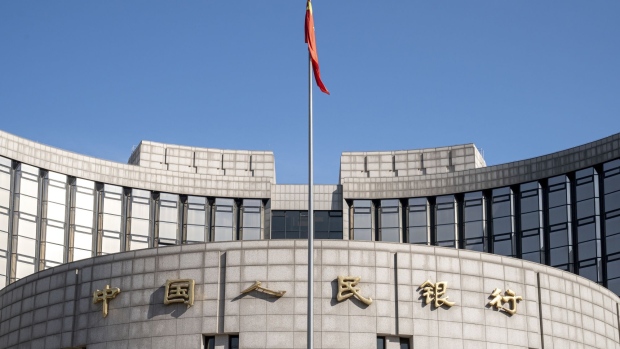Nov 23, 2022
China Signals Likely Reserve Requirement Ratio Cut to Aid Growth
, Bloomberg News

(Bloomberg) -- China signaled more monetary stimulus was on the cards, including a likely cut to the reserve requirement ratio for banks, as it ramps up support for an economy under strain from surging Covid cases and more lockdowns.
The State Council said in a statement Wednesday that monetary tools “such as a RRR cut” will be used “in a timely and appropriate manner” to maintain reasonably ample liquidity. A cut in the RRR -- the amount of cash banks must keep in reserve -- could land as soon as this week, given the central bank usually imposes a reduction within days of a cabinet statement such as this.
China’s economic outlook is darkening as Covid cases climb to a record and cities tighten restrictions to combat the spread of infections. Even with a RRR cut and more monetary stimulus, the economy is still likely to be pressured by Covid Zero. Nomura on Thursday cut its forecasts for China’s growth for this year and next, citing a “slow, costly and bumpy” reopening of the country.
“The RRR is likely to only have a limited positive impact, as we believe the real hurdle for the economy lies in local officials’ more zealous implementation of Covid restrictions rather than insufficient loanable funds,” Nomura Holdings Inc. economists wrote in a note. “Ending Zero Covid as soon as possible is the key to raising credit demand and bolstering growth.”
The State Council statement came as a surprise to some analysts who saw China trending away from conventional easing measures. A recent warning from the People’s Bank of China on inflation also sparked speculation that the scope for further monetary policy easing was coming to an end.
China’s benchmark CSI 300 Index of stocks fell 0.5% as of 1:16 p.m. local time as the country reported a record high number of Covid cases. The yield on 10-year government bonds rose 4 basis points after a decline of 7 basis points in the previous session. The onshore yuan traded 0.28% stronger at 7.1378 per dollar.
Releasing more low-cost cash via a RRR reduction could encourage banks to lend to ailing developers as China takes more concerted steps to put a floor under the property crisis. Regulators this week asked banks to stabilize lending to the firms, a call that’s been heeded by major state-owned banks, who are offering at least 220 billion yuan ($31 billion) in new credit to developers.
“We saw a turning point in how authorities are looking at this sector in terms of the policy decisions, a comprehensive set of funding support for developers,” said Wang Tao, chief China economist at UBS AG, in an interview on Bloomberg TV. “The drag of property on economic growth will be much less next year compared with this year.”
A reserve ratio cut would also replace some of the massive policy loans maturing in the coming months, easing a liquidity stress that otherwise is set to deteriorate as cash demand from businesses and residents grow toward the year-end holiday season. The rate on one-year negotiable certificate of deposits, a key gauge of interbank borrowing costs, spiked to the highest in nearly 11 months last week.
What Bloomberg Economics Says...
The State Council’s call for a cut in the required reserve ratio for banks is not a surprise -- we’ve expected a move by year end. China is struggling with sluggish growth, decelerating credit and Covid flareups that are prompting curbs on activity. Our analysis of liquidity conditions pointed to the need for an RRR cut.
David Qu, China economist
For the full report, click here.
The PBOC last trimmed the RRR in April by 25 basis points for most banks, a smaller reduction than economists had expected.
The PBOC has become increasingly confident in setting monetary policy that diverges from the rest of the world, having allowed for more flexibility in the yuan’s exchange rate and refined capital controls in recent years. Cooling US inflation, meanwhile, has given the Federal Reserve room to potentially start slowing down steep interest-rate hikes, which is also helping limit the yuan’s weakness against the dollar.
The central bank could also make targeted interest rate cuts to guide banks to further lower funding costs for small firms, according to Goldman Sachs Group Inc. economists. Despite the supportive measures, they expected activity growth to remain weak through the rest of this year and the first half of next year.
The cabinet said the foundations of recovery should be consolidated and economic growth kept in a “reasonable range,” according to the statement published by Xinhua News Agency. The cabinet pledged to help the development of online platform companies and ensure the smooth operation of e-commerce operators and delivery networks.
--With assistance from Jing Li.
(Updates with UBS economist’s quote, market prices.)
©2022 Bloomberg L.P.






